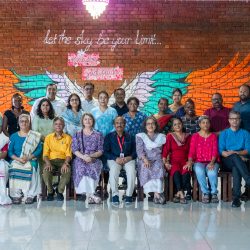Dr Michael Minton writes about IAPCON 2019
We are grateful to Dr Michael Minton, Palliative Care doctor and long-term friend of Indian palliative care from Oxford, UK, for sending us this report on the recently concluded IAPCON at Kochi:
IAPCON 2019 greeted us in Keralan style, a venue in the Aeli hills set in an attractive outdoor setting (provided free) with three large marquees for the meeting, and a temperature which was a challenge for some of us.
The theme was ‘Voices’ which had a thought-out evolution over the three days demonstrating a wide representation of topics and speakers. This ranged from individual patient challenges as presented eloquently, for example, by a young quadriplegic, the voice of the isolated carer (caregiversaathi.co.in), the needs of children, and the challenges of working with the voiceless. Mental health and psycho-social issues were well represented. The concept of palliative psychiatry was voiced.
A new feature, which I thought worked well, was case-based discussions where a clinical case eg. dementia (which I attended), Parkinson’s, head and neck cancer, the bed ridden patient were presented and then followed by a discussion of the topic with experts in the field with contributions from the audience.
In contrast, there was a stimulating talk about the relationship with media and a powerful analysis by Sashi Kumar of the needs and failures of the press/media to participate in some of the big social need questions. It was refreshing to have such a socially conscious programme. This was Voices!
My wife Liz and I had the privilege of reviewing some of the posters. This always provides insight into the range of activities that palliative care has facilitated and the hard work involved. Over the years the quality of the work has continued to improve and ranges from complex clinical studies to descriptive cases. It takes time to appreciate the posters but often they get neglected and don’t get enough space. The only solution, I suggest, is to have the posters on display in the refreshment area where they will gain the exposure they deserve.
Geeta Joshi and I chaired a plenary where senior nurse Alice Stella rallied her colleagues to develop education in leadership skills and reinforced the vital role of nurses in the palliative care team. It was an important contribution and was given alongside Richard Harding reminding us of the importance of measuring the outcomes of what we do (eg use of the African POScale). This is of course important not only for the patient but provides objective data to gain funding. The wider definition of PC as proposed by the International Association of Hospice and Palliative Care (IAHPC) and presented by Lukas Radbruch is all embracing. To those experiencing serious health related suffering it is exemplary as an humanitarian approach. However the debate is whether such an all encompassing definition is distinctive enough for health care funders of palliative care?
On the final day there were intense, well argued, discussions highlighting the ongoing difficulties of patients on life support. The latest legal guidance from the Supreme Court recognises the legitimacy of withdrawing treatment. It is termed “passive euthanasia” by the lawyers. This guidance has proved impractical and bureaucratic to deliver and hence IAPC working with Critical Care is having to request a review of these procedures.
Dr Odette Spruyt, a great friend of Indian palliative care, was sadly unable to be at the conference this year; she herself has undergone cancer treatment. However she had made a video for the conference offering us her reflections of being a patient and highlighting the importance of relationships. The recognition of these personal touches, verbal and physical, that health care professionals can convey and mean so much.
There were of course many presentations that I did not hear but the conference atmosphere was buzzing and I felt the large delegation of over one thousand had an imaginative range of topics to hear and discuss.
Conferences involve huge organisational challenges and while there were some challenges accessing the venue, the content was creative, broad and most importantly represented the growing Indian palliative care scene.





Thank you Dr Minton for such an insightful piece!